
In recent developments, the decision to freeze foreign aid has brought significant concerns to the forefront, particularly regarding its impact on AIDS prevention and treatment efforts across the globe. One of the most critical programs under threat is the President's Emergency Plan for AIDS Relief (PEPFAR), a U.S. government initiative that has been instrumental in saving millions of lives since its inception.
The Importance of PEPFAR
PEPFAR was established in 2003 as a response to the global AIDS epidemic, and it has since become one of the most successful international health initiatives. The program focuses on providing antiretroviral treatment, comprehensive prevention programs, and sustainable health systems in countries heavily affected by HIV/AIDS. Over the years, PEPFAR has been lauded for its life-saving impact, having helped reduce AIDS-related deaths and new HIV infections significantly.
By the end of 2020, PEPFAR was supporting over 15 million people with antiretroviral treatment, preventing millions of HIV infections through education and prevention strategies, and strengthening health systems in over 50 countries. The program's success is largely attributed to its evidence-based approach and its commitment to working with local governments and communities to tailor interventions to specific regional needs.
The Consequences of an Aid Freeze
The recent decision to impose a freeze on foreign aid has raised alarms among global health experts and activists. Such a freeze directly threatens the continuity of PEPFAR's work, potentially leaving millions without access to essential HIV/AIDS treatment and care. The interruption in funding could reverse the progress made over the past two decades, leading to increased HIV transmission rates and AIDS-related deaths.
Countries that rely heavily on PEPFAR funding may face dire consequences as their healthcare systems struggle to cope with the increased burden. This aid freeze could disrupt the supply of life-saving antiretroviral drugs, compromise prevention efforts, and weaken healthcare infrastructures that are already overstretched.
Global Health Implications
The impact of an aid freeze extends beyond HIV/AIDS. PEPFAR's infrastructure has been leveraged to combat other health crises, including tuberculosis and malaria. The program's framework has also been crucial in responding to emergencies such as the Ebola outbreaks in West Africa. Cutting off funding to PEPFAR could undermine these broader health efforts, making it harder for affected countries to respond to various health challenges effectively.
Moreover, the geopolitical ramifications of halting foreign aid cannot be ignored. The United States has long been a leader in global health diplomacy, and PEPFAR is a cornerstone of that leadership. Reducing aid could diminish U.S. influence and credibility in the international arena, particularly in regions where health diplomacy has been a tool for building alliances and supporting stability.
Advocacy and Action
In light of these challenges, advocates are calling for immediate action to ensure that PEPFAR continues to receive the funding necessary to maintain its critical operations. Organizations and individuals are mobilizing to raise awareness about the potential consequences of an aid freeze on global HIV/AIDS efforts. Advocacy campaigns are urging policymakers to reconsider the freeze and prioritize the health and well-being of millions of vulnerable individuals worldwide.
Activists emphasize the moral and humanitarian imperative of supporting programs like PEPFAR, which have a proven track record of success. They argue that investing in global health is not only an ethical responsibility but also a strategic one, as healthy populations contribute to global stability and economic growth.
In conclusion, the decision to freeze foreign aid poses a significant threat to global health initiatives, particularly PEPFAR. As the world continues to grapple with the ongoing challenges of the HIV/AIDS epidemic, the need for sustained support and funding is more critical than ever. It is imperative for the global community to rally together and advocate for the continuation of programs that save lives and foster healthier futures for all.
Related Posts
Triumphant Trans Woman Wins Legal Battle and Inspires Others to Stand Up for Their Rights
Breaking new ground: a landmark victory in transgender rights After battling in courtrooms and enduring endless challenges, Diana Portillo, a transgender woman, has secured a monumental victory in her decade-long fight against workplace discrimination. The result? Nearly $1 million awarded in a historic settlement. But this isn't just a win on paper—it represents a powerful precedent in combati [...]
Pride Month in Latin America: Protests and Demands for Equality
**Celebrating Pride and advocating LGBTQ+ rights in Latin America** Pride Month in Latin America was a lively mix where celebration met activism. Communities united, not just throwing a party but making a stand—demanding equality and pushing governments toward better protection and rights recognition. Throughout Latin America, pride events erupted in marches and cultural displays, each with a c [...]
Transgender Erasure Actions Implemented by National Park Service
```html Trump administration's impact on national park service and transgender recognition The Trump administration made notable moves in undermining transgender representation, which included directing agencies like National Park Service not include "T" and "Q" when they refered “LGBTQ” in any official communication. This move seems part a broader plan by this administration aimed at reducin [...]